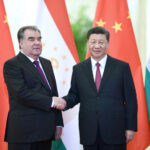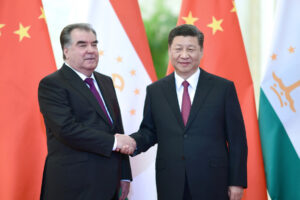As his hasty Afghanistan exit looms larger as a strategic blunder, President Biden is still blaming his predecessor for the debacle, arguing the former President Trump tied his hands.
It’s Trump’s fault, the administration insists, that Afghanistan has collapsed into a pre-9/11 narco-terrorist state run by medieval mullahs brutalizing women all over again.
“The last president signed an agreement to get out,” Biden reminded reporters during last month’s marathon White House press conference.
But the truth is, it was the other way around.
Trump essentially inherited what Biden started nine years earlier as vice president, according to White House e-mails and U.S. officials who investigated his old office’s secret dealings with the Taliban.
Biden had advocated withdrawing from Afghanistan when he served as President Obama’s vice president. The White House shared a common goal with the Taliban in ending the war, concerned as it was that the long troop deployment looked like the “occupation” of a Muslim nation. And Biden’s then-national security adviser — Antony “Tony” Blinken — spearheaded an effort to achieve that goal, which included as its centerpiece a once-covert plan to spring from the Guantanamo Bay terrorist prison basically the entire old leadership of the Taliban captured by U.S. forces after the 9/11 attacks.

“Tony Blinken got the ball rolling long before Trump, undercutting the notion that Biden was boxed in by Trump,” said Christopher Bright, who led a House Armed Services Committee investigation of the Obama administration’s jailbreak of the Taliban honchos.
The shocking 2014 paroling of the so-called Taliban Five, which was sold as a patriotic move to free an alleged Afghan “P.O.W.” — US Army Sgt. Bowe Bergdahl — paved the way for the creation of a shadow Taliban government in Qatar.
That Taliban government in exile was used to formally negotiate the ill-advised U.S. withdrawal agreement.
“The White House just wanted the Taliban Five out to start that process,” Bright said. “That’s now more apparent in hindsight.”
All five former Gitmo inmates ended up sitting across the negotiating table with Biden’s envoys to hammer out details of the troop withdrawal, and all five are now in key posts running the government in Afghanistan, which they’ve renamed the “Islamic Emirate.”
Without their release — orchestrated by Blinken, who is now Secretary of State under Biden — there likely would be no troop pullout or Taliban takeover, and 13 U.S. service members slaughtered while guarding a mass evacuation at the Afghan airport would still be alive today.
As head of the Congressional investigation, Bright obtained administration e-mails that outlined Obama and Biden’s moves.
In 2011, Obama promised to start withdrawing all American forces from Afghanistan. Such a drawdown required engaging with the Taliban in peace talks, Bright noted, and releasing several of their senior leaders would advance the administration’s negotiating position.



The next year, Biden’s office floated to the Defense Department and other agencies the idea of trading five Taliban commanders jailed at Gitmo for Bergdahl, the US soldier held by the Taliban. But then-Defense Secretary Leon Panetta balked.
“I opposed the swap,” Panetta wrote in his memoir. “I did not believe it was fair to trade five for one.”
But Panetta was soon replaced by Chuck Hagel, who was open to the idea.
Within months of Hagel taking over the Pentagon in February 2013, the swap scheme was resurrected. In June 2013, the exiled Taliban government opened a “political office” in Doha, Qatar, and the Obama administration formed “the interagency Taliban reconciliation group” which made it clear it was interested in releasing the Taliban commanders.


In December 2013, Hagel personally traveled to Doha to begin the process of drafting a memorandum of understanding, or MOU, with Taliban representatives for the Taliban Five.
“Blinken was actively involved in overturning secretary of defense and other objections to the [Gitmo] transfer,” Bright said, “instituting an irregular review and security process, and proceeding nonetheless.”
As negotiations progressed, Blinken and other administration officials used coded language in emails to discuss the secret deal, using “third party” as a euphemism for the Taliban, for example.
“We achieved our immediate objectives: signaling to the third party our interest in pursuing this matter,” Hagel’s top military attorney Stephen Preston briefed Blinken and other officials in a December 2013 e-mail about their trip to Qatar.
By then, Blinken had been promoted to deputy national security advisor under Susan Rice, where he rode herd on finalizing the MOU to secure the still-secret deal. (Jake Sullivan replaced Blinken as then-veep Biden’s security adviser.)

Career military officers, miffed at freeing Taliban commanders the Pentagon classified as too dangerous to release, leaked the scheme to the media.
Furious over the breach, Blinken lashed out in a February 2014 email to Pentagon brass: “I know you share my dismay, and frankly, disgust, at the leak in today’s Washington Post about our Bergdahl efforts.”
But the leaks failed to derail the final deal he negotiated with the Taliban through Qatari intermediaries. A few months later, Blinken authorized Preston to execute the final agreement. “Tony has okayed the signing of the MOU,” according to a May 2014 e-mail circulated by a National Security Council staffer.
That same month, Obama announced he planned to end US troop presence in Afghanistan by 2016.
To get everybody on board the swap, Blinken had chaired a number of interagency “deputies meetings” in the months leading up to the June 2014 release of the five Taliban fiends. A month prior to the release, he and other officials actually entertained a last-minute Taliban demand to free a sixth Taliban detainee before settling on the original five. Hagel signed their release order.
News of their release sparked a firestorm of outrage. Congress complained it was not consulted about efforts to arrange the swap as required by law.
Others pointed out the Taliban Five were the only “forever prisoners” released without being cleared by the Gitmo parole board, and some of them had been linked by US intelligence to Osama bin Laden and other al-Qaeda terrorists.
Obama justified their release as a worthy exchange for a war hero. After the Taliban returned Bergdahl, Obama held a Rose Garden ceremony with his parents celebrating their son as a “POW,” a designation the Pentagon never gave him.
“We’re committed to winding down the war in Afghanistan,” Obama said, hinting at the real reason for the deal.

It took years to find out the truth about Bergdahl, who was captured after deserting his post in Afghanistan. He was no hero. He ultimately was court-martialed and pleaded guilty to desertion and misbehavior before the enemy. In 2017, he was sentenced to a dishonorable discharge.
But Obama, Biden and Blinken, along with Rice and Sullivan — who are now serving Biden as top advisers in the White House — got what they wanted out of the ruse: a major token of good will to start withdrawal negotiations with the Taliban.
At the time, Obama assured a wary public that the dangerous enemy combatants would be transferred to Qatar and kept from causing any trouble in Afghanistan. In fact, they were left free to eventually mastermind last August’s sacking of Kabul. And they did so in luxury. Within months of arriving in Qatar, the Taliban leaders were housed in small palaces inside an exclusive neighborhood in suburban Doha and provided fancy new SUVs to drive.
The Obama-Biden administration pressed ahead with their plan in spite of several red flags. Soon after gaining their freedom, some of the notorious Taliban Five pledged to return to fight Americans in Afghanistan and made contacts with active Taliban militants there. But the administration turned a blind eye to the disturbing intelligence reports, and it wasn’t long before the freed detainees used Qatar as a base to form a regime in exile.

Fast-forward to 2021. Last year, the Taliban Five sat across the negotiating table from Biden’s envoy to Afghanistan, Zalmay Khalilzad, where they participated as key members of the official Taliban delegation who negotiated the final terms of the US withdrawal. The retreat cleared a path for the Taliban to retake power after 20 years.
Khairullah Khairkhwa and other former Taliban prisoners assured Khalilzad that the Taliban would not launch a military offensive if Biden committed to removing all remaining American troops. In turn, Khalilzad convinced Biden and Blinken that the Taliban would share power with the US-backed government in Kabul.
“I do not believe the government is going to collapse and the Taliban is going to take over,” Khalilzad affirmed, while whitewashing the Taliban as “changed.”
But all the while, Taliban militants were taking large chunks of Afghan territory around the capital Kabul, encircling the US-backed regime there, waiting to take over the moment the last US troops left. Taliban negotiators made it clear they weren’t interesting in any power-sharing and sought to reestablish strict Islamic rule without outside meddling.

As Khairkhwa warned in an al-Jazeera interview conducted during one of Biden’s “peace” summits: “I started jihad [holy war] to remove foreign forces from my country and establish an Islamic government, and jihad will continue until we reach that goal through a political agreement.”
He added that Taliban attacks on Afghan army posts were not off-limits, that they never agreed to a ceasefire with the US-backed Ashraf Ghani administration, and that “the intelligence of Kabul know that they cannot stay in Afghanistan after the withdrawal of the foreign forces.”
Meanwhile, Blinken pushed Ghani to capitulate to the Taliban on several issues and even possibly step aside, according to Congressional Research Service analyst Clayton Thomas.
Little wonder the Taliban seized control of Kabul in mid-August and stormed the presidential palace without firing a single shot. Hoping to escape their clutches, thousands of panicked Afghans and foreigners fled to the airport, resulting in a humanitarian crisis lasting weeks.

It’s plain that Biden and his diplomats got played by the Islamist thugs they assumed were rehabilitated. They thought they were dealing with a more pragmatic Taliban.
They should have known better: During the secret 2014 talks over their release from Gitmo, Taliban representatives used in their messages the abbreviation “IE” — Islamic Emirate — for the name of their shadow Afghan government. The Islamic Emirate of Afghanistan is what the Taliban called the country when they ruled it from 1996 until US forces toppled their regime in 2001.
That old Islamic Emirate flag now flies again over Afghanistan.
President Trump wanted out of Afghanistan just as badly as Obama and Biden did, but he was handicapped by the fact that the Taliban leadership was already free and regrouping — they were bargaining from a position of strength, and deception.
The same five Taliban leaders captured by US troops and sent to Gitmo to rot in jail ended up getting to negotiate the removal of those very troops.
Obama, Biden and Blinken escorted the 9/11 terrorist-harboring creeps from prison cells to palace suites.
Source : New York Post















